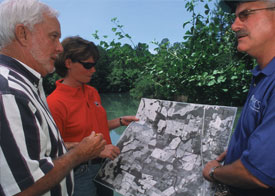|
|
 |
PAGE 38 / 56 |
 |
Unit 2: The Agricultural Professional's Role
BALANCING THE TECHNICAL AND THE RELATIONAL
 |
Agricultural professionals work with a landowner in Vienna, Georgia, to develop a conservation plan for his farm. (Dot Paul, USDA NRCS) |
Developing the technical expertise described in the previous section may require some time, effort, and practice. But as noted, you can use assessment tools and techniques to assist you in the process. More challenging, may be the relational aspect of working with farmers and ranchers to help them see the big picture and to encourage them to make changes in their system.
The traditional or historical role of agricultural professionals is evolving as farmers have become increasingly sophisticated, and as the types of problems and opportunities they face seem to get ever more complicated.
To work effectively with farmers requires a wide range of skills. Yes, it is still essential to have technical expertise and to extend technology and research results from the land-grant universities to producers. This "traditional" approach to extension is largely aimed at helping farmers and ranchers find solutions to specific problems, and has been an effective strategy for making improvements in agriculture.
But the "problem-solution" approach has limitations when it comes to looking at the sustainability of a whole farm or the food system in your region. From the broader perspective of sustainable agriculture, the needs of producers and communities go beyond specific issues and problems related to production, management, and marketing. |